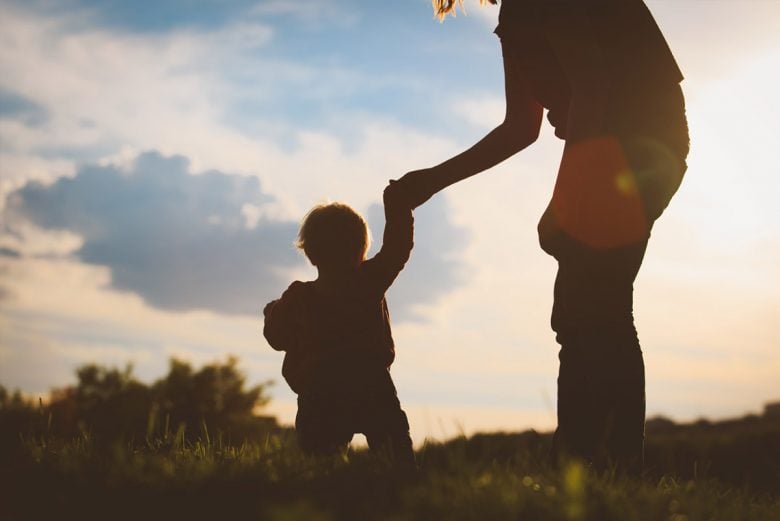
Sometimes, you just know.
In the ups and downs of parenting, you can tap into a powerful guidance source to keep taking the next correct step through it all.
Intuition is one of your greatest guidance tools as a parent. The more you trust it, the more it develops. In this episode, Carol and Anne share how the 4 Types of parents are most likely to recognize intuition and personal stories to help you tune into your own intuition with confidence.
This Episode’s Parenting Practice
1) Pay attention to how you experience intuition. 2) Some situation will present itself this week for you to receive intuition around. Trust it and move forward. 3) Then express gratitude for it and you’ll receive more.
Transcript of podcast episode
Anne: And so, I had heard a family that had like, tied the binky onto a balloon and you’re like, “Let it go.” And it’s like, “Yay. Bye-bye, Binky.” Like, a big celebration. So I was like, “Oh, that sounds like a fun way to do it.” It wasn’t.
Carol: Welcome to The Child Whisperer Podcast. I’m your host, Carol Tuttle, author of the best-selling parenting book, The Child Whisperer. I’m with my co-host Anne Tuttle Brown. Today, we’re talking about what I feel is one of your greatest guidance tools as a parent and that is your intuition. That sense of knowing this aha, this feeling that you can relate to and say, “I know this is correct.” It’s an inner state of awareness. It’s something that develops the more you trust it. I think it’s one of your greatest tools because it’s, I feel, driven by divine guidance. And as God knows you, your children, and your scenario, you’re being guided in what is correct in your role as a parent. It’s a right of every parent to be given intuitive guidance, inspiration, the ahas they need in the moment to know how do I deal with this?
Anne: Do you think each Type of parent receives intuition true to their Type?
Carol: I think so. Type 1 parent would be like a flash, an aha, a…
Anne: Probably a bubbling up and then excitement.
Carol: It’s like a bright light, a boom, and yet if they dismiss it, if they question it, it will just…it’s like popping bubbles and it goes away. So you’ve got to trust that sort of hit, it’s like a burst of a hit. And I see my Type 1 daughter who’s the mom of four boys really get those and I’ve encouraged her to trust them. As she dismisses them, they don’t come as frequently and they are not enhanced, see? The more you trust it, the stronger it gets, the more you can trust it because you know what it is. You’re reading it, you got communication with it, an inner sense of awareness that goes, “I know what this is. I’m being given it because it’s coming from a higher source to guide me as a parent.” And a Type 2, I think, would be more emotional and maybe in your heart center or your gut maybe. What is it like for you?
Anne: It’s more, yeah. In my heart, it’s like a…like a sigh of relief of like, “This is right.” Just a very kind of clear quality.
Carol: A feeling like you can move forward?
Anne: Like, a feeling of moving forward.
Carol: Like things opened up?
Anne: Mm-hmm. Yeah, definitely.
Carol: For Type 3, I think there’s a more passionate experience with it of…it’d become like, “This what I need to do. This is my next step.” It’s kind of an action…
Anne: I know. Yeah. Very clear of kinda like, “This is how I’m moving forward.”
Carol: Yeah. This is the next thing I need to do. This is the action that this requires. Either I need to say this, I need to do this. This is the next step. Type 4 would be more of an intellectual hit with a knowing. It’d be like when they say, “I need to figure this out,” it’s like you figured it out without having to go through the process of figuring that out.
Anne: You can probably see…
Carol: The “figure it out” was given to you, here it is.
Anne: And you probably see a more big picture how it will unfold. So there is that sense of clarity.
Carol: And so, intuition is a blessing I feel every parent’s right. I think mothers probably have a stronger sensory mechanism to it than fathers possibly. I think it’s your maternal nature, it’s you’re more…just the way our brains work. We’re more emotional as females than males and so, it works through that capacity of a sensory mechanism that’s an inward hit through those variables depending on your Type. And as a mother, I learned to really trust it and then depend on it in a way like, I knew I’d be given it. It became an operating skill set for me that I would be intuitively guided. One example, I felt moved when Jennifer, our oldest daughter was very young when she was 5 or 6 years old, I felt moved to say a prayer that I think it’s interesting because it’s not a common prayer. I was given the inspiration to say, “If there’s any talents my children have that I do not have any background in, help me to recognize their talents and support them in developing them. Because there might be things they want to do in life, I don’t have any clue about how to get them involved.” Well, it presented itself a little later in her life. In her early teens, she had a gift for singing and that was an answer to that prayer because we were led to the right people.
Anne: You’re not a singer, huh?
Carol: Not a singer. Know nothing about that world besides what I’ve learned from my daughter. I didn’t have a background in music and it’s very common that if a parent has background in music, you bring your children into that world. It’s a lot harder to get a child in that world at a very high level when you don’t have that background.
Anne: At an older age, in her teens already.
Carol: Yeah. She’s like 14, 15. She went on to get her bachelor’s degree in vocal performance as a soprano. She’s trained to sing opera. I mean, she went far with it.
Anne: She did. She’s very talented.
Carol: She’s taught voice lessons, she has a natural gift for it. It was a talent, a natural talent that I think that prayer that I was led to say then, not in a close time proximity, but somehow I remembered saying that prayer when it showed up.
Anne: That’s interesting.
Carol: I’m like, “I’m being given the guidance here because I don’t know this world.”
Anne: I’m sure all along that process, I’m sure you continued to rely on your intuition on what’s the next step as you and Jenny kind of figured this out.
Carol: Yeah. So I really began to really… I was so grateful for it because I knew this doesn’t all depend on me. God is watching over me. I’ve got a higher authority that’s got my back and my children’s. I just gotta really allow it, rely on it, trust it, and let it grow. And it did through the years.
Anne: I think as a result of using that as a mother, you teach your children how to rely on their own intuition.
Carol: You come to me even now as an adult to get my intuitive feedback.
Anne: Yeah, I know.
Carol: Like, “My mom’s super…”
Anne: You’re the Child Whisperer.
Carol: “My mom is super intuitive. I’m gonna just ask her what she’s tuning into.”
Anne: What gets in the way of a parent’s intuition?
Carol: The questioning. Now, turning outside yourself, sourcing other people, experts to see what they have to say and making a comparison. Now, it’s okay to turn…maybe your intuitive hit is to seek information, learn more, you’re guided to an expert, you’re guided to a book, you’re given the direction through other means outside of you. But it’s because you’re trusting that intuitive hit. It’s when you don’t trust that question, now, you’re looking for validation outside yourself, it diminishes. You weaken the capacity to receive this guidance because you’re not giving it the value that it’s meant to be given.
Anne: There’s a blogger that a couple years I saw when I was pregnant with my first baby and she said like, everything that you can and can’t do when you have a baby. And it was like there was one thing that was said like, what’s the baby’s first food was this… But then there was an article about, “No,” how that’s not the best baby’s first food, or, ”The baby should sleep…” And it was like, anything that anyone’s told you could be countered by something some other expert has said.
Carol: Oh, for sure. Based on…and guess where they came up with all that? It was what was correct for them.
Anne: Exactly.
Carol: It was their model they’re sharing. That’s why I’m careful in our world to say, “Look, here’s a model. Here’s potentially something that ultimately, you’re gonna know what’s correct.” And so, you’ve got to take…
Anne: And build on what we’ve said. Like, this may spark ideas that will then build. And so, I think the point of that blogger was exactly what we’re saying like, there’s so much out there, like, to filter through and it can be so overwhelming as a mom, especially with your first kid. Like, you just have to do what you feel is right and go to those sources that you trust, and then move forward.
Carol: Well, with The Child Whisperer parenting model, it makes it quite easy because once you understand this set up, your child’s nature, what their natural gifts and tendencies are, what provokes cooperation from them, what motivates them, you have this working model to receive guidance and intuitive hit within your child’s Type to get the insight. In the moment, I hear this from parents a lot over the years that my capacity to be inspired and intuitive about my child’s needs is heightened to such a degree of success because of “The Child Whisperer” because now, I have a paradigm to see them in. I get them. And it’s kind of like, in the Dressing Your Truth world, we teach you how to avoid all these clothes, so we teach in the parenting world how to avoid all these strategies. Now, these ones will work with that Type of child. So it makes it easier.
Anne: And choosing from that. Yeah. Exactly.
Carol: And that allows you the… It just fine-tunes your intuition at another level when you have a model like this.
Anne: So I have an example of a time I didn’t follow my intuition and a time when I did. My daughter was about 2 and I decided that it was time for her to be done with her binky. She was already just supposed to use it while she was in…
Carol: Was that something you read?
Anne: Yeah. Well, you know, like binkies are, you know, they could mess up your teeth or they could impact how they’re speaking if they have like, a binky in a lot. And so, and it was just bothering me like it was around a lot. She had it in more than I wanted her to and so, out of my frustration, I decided she was done. And so, I had heard a family that had like, tied the binky onto a balloon and you like, “Let it go.” And it’s like, “Yay. Bye-bye, Binky!” Like, a big celebration. So I was like, “Oh, that sounds like a fun way to do it.” It wasn’t.
Carol: They’re like…
Anne: We have it on video and it’s like, one of my favorite things because it was just such a parent fail.
Carol: She probably likes watching it now too.
Anne: Oh, it was flying up to the sky and she called it a gaga, and she goes, “Where did my gaga go? I want my gaga back.” Just falling tears and then I think we had one stowed away and my husband went and got it. And he’s like, “This isn’t working.” And so, she went to a nap with her binky 10 minutes after we flew it up to the sky. So, now, move forward six months and she’s about two and a half. And I put her down for a nap, and this was still like, “Okay. When is it gonna be done?” But I was kinda just not trying to force it because the first time went over so bad. But at this moment her binky wasn’t in her crib. So, it like, wasn’t there and I just had this flash of like, “Now, is the right time.” And she asked for it once and we had a trip coming up to Disney. And I used the tactic, I said, “Big girls go to Disneyland. Big girls don’t have binkies.” And she looked at me and she goes, “Okay.” And she went to bed and I was like… And I just contrasted that with before that was motivating me was my frustration, my angst, my…everybody said, the “shoulds.”
Carol: That’s what drove that first attempt.
Anne: And this was just like, this is time. And it was…it worked.
Carol: This week’s parenting practice is a two-step process. One, identify how you experience intuition, give it recognition with awareness. The second step is something will present this week for you to receive intuition around. Trust it and move forward, and apply it.
Anne: And then express gratitude for it.
Carol: There you go.
Anne: And you’ll receive more.
Carol: Yes. Very good. I’m excited for you to become a very intuitive parent and it will only bless your life and your children’s. Thanks for listening. For more support, go to thechildwhisperer.com where you can purchase the book, subscribe to our weekly parenting practice e-mail, and find a transcription and audio of “The Child Whisperer” podcast.
Anne: If you’re listening on iTunes, thank you for leaving your review. If you have a parenting question, please send it to [email protected].



